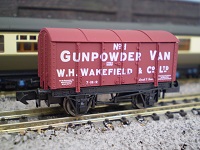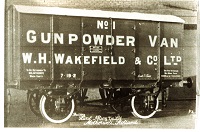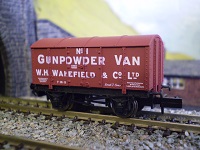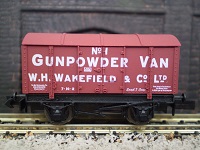Traditional gunpowder, also known as 'black powder', was invented in China over a thousand years ago. It consists of a mixture of a nitrate ( typically potassium nitrate or 'saltpetre' ), sulphur and charcoal, and is used as a propellant in firearms and as an explosive in quarrying and mining. Within a couple of hundred years its use had spread across the civilised world, and by the dawn of the Victorian era its production was a major British industry. One of the centres of the industry was the rural area of Westmorland in the far north-west of England, where fast-flowing rivers provided power to the mills and where there was a plentiful supply of local timber for charcoal. The largest producers were a consortium controlled by the Wakefields, a local family of astute Quaker businessmen, who had enough influence in the area to have the Lancaster Canal extended to the village of Sedgwick in order to serve their gunpowder works. Business was booming, and things went on to a whole new level when the Lancaster & Carlisle Railway opened in 1846. The nearest station to the Wakefield works was at the village of Milnthorpe, and the gunpowder was taken there by road to be loaded into steel vans for onward distribution.
William Henry Wakefield took over the family firm on the death of his father James in 1866, and the business went from strength to strength. The family also owned a bank, and the combination of banking and gunpowder made them very wealthy indeed. Their distinctive dark red vans carrying the family name would have been seen all over Britain's railway network, carrying their dangerous cargo of black powder to the mines and quarries and ordnance factories of the UK. But technology eventually came up with better and safer explosives, and the demand for traditional black powder dwindled away. The Wakefield gunpowder business was taken over by Nobel Industries, which in turn became one of the founding companies of the industrial giant ICI, and production at the various Westmorland sites was gradually discontinued until the final works closed in 1935.
Today the sites have largely returned to nature, although some of the original structures remain, derelict and overgrown, showing that this rural backwater once housed a major industry. Black powder is still used in small quantities for various specialised applications, but its production is no longer big business in modern-day Cumbria. And the Wakefield family are long gone from their stately home at Sedgwick House. Time and industry have moved on, but you can make things go with a bang on your layout with our Wakefield gunpowder van.
Original archive photograph reproduced by kind permission of the Historical Model Railway Society.
For further information visit
www.hmrs.org.uk
|









